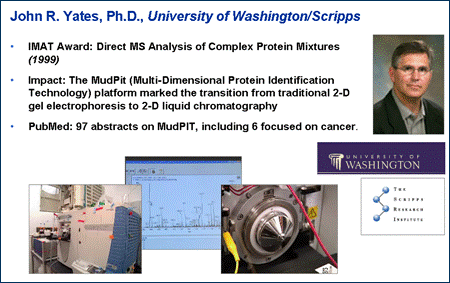| PI | Institution | Title | IMAT Award Type |
|---|---|---|---|
| John Yates | Scripps Research Institute | Direct MS Analysis of Complex Protein Mixtures | R33 |
MudPIT is a non-gel technique for separating and identifying individual components of complex protein and peptide mixtures. The seminal publication on MudPIT showed the potential for applying the technology to proteomic analyses usingSaccharomyces cerevisiaeand has been cited 1,236 times since its publication.Instead of using traditional two-dimensional (2D) gel electrophoresis, MudPIT separates peptides in 2D liquid chromatography. This allows greater separation of peptides that can be directly interfaced with the ion source of a mass spectrometer, which maximizes sensitivity. MudPIT avoids the band broadening associated with many chromatographic steps, which can decrease resolution.

John R. Yates, Ph.D., University of Washington/Scripps
- IMAT Award: Direct MS Analysis of Complex Protein Mixtures (1999)
- Impact: The MudPIT(Multi-Dimensional Protein Identification Technology) platform marked the transition from traditional 2-D gel electrophoresis to 2-D liquid chromatography
- PubMed: 97 abstracts on MudPIT, including 6 focused on cancer.
The overall goal of the IMAT award (R33CA081665) to John Yates at the Scripps Research Institute was to develop and optimize methods for the direct analysis of individual proteins within complex mixtures. Specific aims of the research were directed at improved sample preparation, peptide separation (via multidimensional liquid chromatography), and data acquisition using tandem MS.
During the award period, solubilization of cell lysates and protein digestion conditions were improved, and 2D liquid chromatography conditions were optimized for the analysis of complex mixtures. Methods for quantification of proteins in mixtures were also developed, including the development of software tools (DTAselect and Contrast) to filter and display database search results for Shotgun proteomic applications. The software tools are available to the research community through licensing agreements with the Scripps Research Institute.
Additional applications of the technology were developed during the grant period, including studies to identify new genomic elements, the analysis of protein modifications in protein mixtures, and the identification of membrane proteins.
MudPIT has been used to identify and characterize 82 peptides in endogenous complexes that were immunoprecipitated from the androgen receptor from prostate cancer cells.Information on these novel proteins could lead to better treatment or prevention interventions for advanced prostate cancer. The technology was also used to identify novel proteins released by pancreatic cancer cells involved in extracellular matrix remodeling.In this study, MudPIT allowed efficient and rapid identification of proteins released by the cancer cells, including molecules that had not yet been described for the type of cancer analyzed.
PubMed lists 97 abstracts on MudPIT, including 6 focused on cancer.
1 Wadhwa R, Takano S, Kaur K, Aida S, Yaguchi T, Kaul Z, Hirano T, Taira K, Kaul SC. Identification and characterization of molecular interactions between mortalin/mtHsp70 and HSP60.Biochem JOct 15; 391(Pt 2):185-90, 2005.
2 Washburn MP, Wolters D, Yates JR. Large-scale analysis of the yeast proteome by multidimensional protein identification technology.Nat BiotechnolMar;19(3):242-7, 2001.
3 Comuzzi B, Sadar MD. Proteomic analyses to identify novel therapeutic targets for the treatment of advanced prostate cancer.CellscienceJul 27;3(1):61-81, 2006.
4 Mauri P, Scarpa A, Nascimbeni AC, Benazzi L, Parmagnani E, Mafficini A, Della Peruta M, Bassi C, Miyazaki K, Sorio C. Identification of proteins released by pancreatic cancer cells by multidimensional protein identification technology: a strategy for identification of novel cancer markers.FASEB JJul;19(9):1125-7, 2005. Epub 2005 May 4

